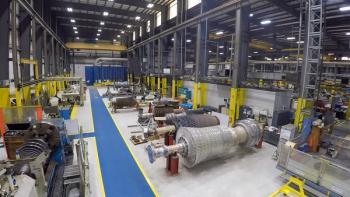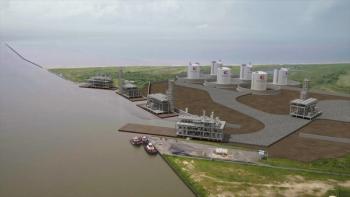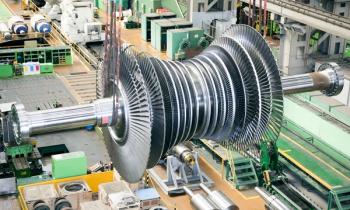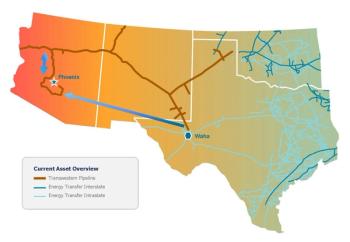
TPS 2024: Compressor Anti-Surge Control Improves Energy, Carbon Performance
Anti-surge control systems prevent damage and improve turbomachinery performance by using controllers, valves, and transmitters to measure flow, pressure, and temperature.
At TPS 2024, numerous presenters from Compressor Controls Corp. (CCC) and Petrobras hosted a paper presentation, Optimizing Compressors Anti-Surge Control to Reduce Power Consumption and Greenhouse Gases Emissions in Oil Production Units. The session was led by Pedro Barbosa, Turbomachinery Advisor at Petrobras, Serge Staroselsky, Chief Technology Officer, and Fabio Jacinto Zanetti De Souza, Brownfield Account Manager—both from CCC.
The presentation specifically analyzed the energy and carbon performance of compressor anti-surge control on existing offshore platforms in the Brazilian pre-salt fields. Turbomachinery control optimization increases energy efficiency and reduces carbon emissions as a result, enabling offshore operations to achieve sustainability and adhere to stringent environmental standards.
FPSO Compressor Challenges
Barbosa presented several challenges with running a gas compressor on a floating production, storage, and offloading (FPSO) vessel in the Brazilian pre-salt fields:
- Gas compressors are the largest power consumers and greenhouse gas emitters aboard an FPSO vessel
- FPSOs have highly variable operating conditions over unit lifecycle
- Following startup, gas compressors are difficult to tune
- Pre-salt FPSOs contain complex plants with high CO2 content
- Gas reinjection increases CO2 content, affecting compressor curves and surge lines
Referring to Petrobras’ case study on its own pre-salt FPSO, Barbosa addressed further compressor difficulties that could be assisted by anti-surge control. “When the unit is treating gas for exportation, it passes through a CO2 removal plant to the export compressors, then to a gas pipeline,” said Barbosa. “The compressors begin to work in a non-flow-sharing mode, meaning that one machine can be used for exportation and the other rejects non-treated gas. The machines begin to compete, with one increasing flow and the other decreasing—this is when surge control becomes important.”
Controlling the Surge
According to Staroselsky, Petrobras leveraged an anti-surge control system to achieve multiple performance benefits: equipment protection, improved efficiency, increased reliability, and enhanced safety.
Equipment Protection: Anti-surge systems detect when a compressor is approaching surge conditions and take corrective action to prevent the condition from occurring.By preventing surge, these systems can help to reduce the frequency and cost of maintenance and repairs.
Improved Efficiency: They can help to optimize compressor operation by maintaining their most efficient point, thus reducing energy consumption. Minimizing unnecessary power output keeps gas compressors from emitting large amounts of CO2 from FPSOs.
Increased Reliability: The systems reduce compressor downtime and improve overall plant productivity and process stability. Gas recycling can also be reduced by controlling system margins, such as anti-surge valve performance and flow measurement signal quality.
Enhanced Safety: Surge can lead to dangerous conditions, such as sudden pressure surges or vibrations. Anti-surge systems can help reduce the risk of accidents and improve overall safety on FPSO vessels.
Following anti-surge control integration, “We calculate the operating point of the machines, we calculate power, and then we assess anti-surge valve closing to see how much we’ll save,” said Staroselsky. “After the calculations, we reduced the margin by 5% and, in the minimum case, saved 170 kW of power. In the maximum case, during operation over the entire year, we could generate around 500 kW in potential savings.”
Carbon Mitigation
De Souza closed the tutorial with Petrobras’ projected carbon savings after utilizing the compressor anti-surge control system. “The reduction in recycle flow would lead to an overall efficiency increase of 4%,” said De Souza. “In an FPSO powered by gas turbogenerators, it will reduce fuel-gas consumption by 630,000 standard cubic meters per year. The carbon emissions that can be saved with this optimization would reach 1,600 tons of CO2 per year. All these numbers are calculated for a single 11-MW compressor train—an FPSO contains five to six of these trains.”
Optimizing these control systems can provide relevant carbon savings without exposing the compressor, which was tuned and in automatic mode, to surge events. This application found that anti-surge can be used for any compressor that operates with recycle flow, establishing a low-cost alternative to reduce power consumption and carbon emissions. In addition, no prior changes were required to implement the control solution.
Petrobras plans to use anti-surge control across its entire pre-salt FPSO fleet, but will continue to search for additional carbon saving opportunities with load sharing, balance, and process setpoints.
Check out the
Newsletter
Power your knowledge with the latest in turbine technology, engineering advances, and energy solutions—subscribe to Turbomachinery International today.




